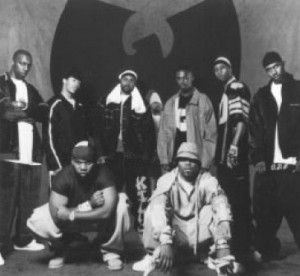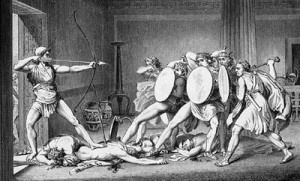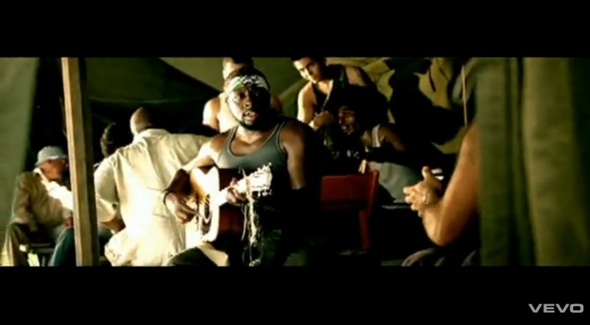See I’mma tell you like Wu told me
Cash rules everything around me.
Singin’ dolla dolla bills y’all
Singin’ dolla dolla bills y’all
This refrain is powerful. I could give it another thousand words all by itself.
First off, Wyclef and Akon reference one of the pillars of rap music, “C.R.E.A.M.” by the Wu-Tang Clan, off of Enter The Wu-Tang (36 Chambers). I’d have a hard time overstating the importance of this album, and this song in particular, to the last twenty years of the genre. If you’re completely square to the history of hip-hop, let me draw an analogy: it’s about as important as the Book of Exodus is to the Old Testament. It’s that big of a deal.

The giants in the earth, the men of renown.
Of note: this particular phrasing is almost identical to the Notorious B.I.G.’s call-back to “C.R.E.A.M.” on his posthumous track, “Notorious Thugs.” So this reference touches on two of the titans of East Coast rap: the Wu-Tang Clan and Biggie Smalls. Which is noteworthy since only one of the artists on this track is from the East Coast. Akon hails from Senegal, Africa; Wyclef was born in Haiti and Lil’ Wayne represents the Dirty South (specifically New Orleans). Only Niia, the female vocalist who sings a descant over some of the song, comes from the Eastern seaboard: Needham, MA.
So that’s the source of the callback. Again, this ties into the overall theme: teaching a lesson about poverty using the wisdom of the elders. Wyclef and Akon invokes some of the most powerful names in hip-hop – Jay-Z, GoodFellas and Wu-Tang – to hammer their point home.
Second, the nature of the callback. Akon doesn’t just drop another rapper’s verse into his song. He tells you what he’s going to tell you. “I’mma tell you …” Why doesn’t he just say it? Akon is calling the audience to attention: listen close now, he says. Everything else was just setting the scene. Now I’m TELLING you. We see this distinction elsewhere in black culture in the U.S. The phrase “run and tell that” does not mean, literally, “stop listening to me, sprint away and deliver this news to someone else.” It means “believe what I’m saying as you would an urgent truth.” See also the African-American spiritual “Go Tell It On The Mountain,” etc. Before, we were just chatting. I was just describing the unfortunate story of this girl, the Sweetest Girl. But now I’m TELLING you.
But Akon isn’t just telling you. He’s passing on wisdom he received from another source. “I’mma tell you like Wu told me.” He doesn’t need to explain that “Wu” is short for “Wu-Tang,” which in turn is short for “The Wu-Tang Clan,” who were not in fact Mandarin martial artists from the Ming Dynasty but a crew of hardcore rappers out of Staten Island. Everyone knows who the Wu is. This is, again, to add the weight of elder wisdom to Akon’s pronouncement. It’s not just me saying this, Akon says. This comes from The Seat of Power.
Where else do we see that? A didactic declaration of the theme. An invocation of a divine source of creativity. Does anything else in the Western canon do that?
Tell me, O muse, of that ingenious hero who travelled far and wide after he had sacked the famous town of Troy. Many cities did he visit, and many were the nations with whose manners and customs he was acquainted; moreover he suffered much by sea while trying to save his own life and bring his men safely home; but do what he might he could not save his men, for they perished through their own sheer folly in eating the cattle of the Sun-god Hyperion; so the god prevented them from ever reaching home. Tell me, too, about all these things, O daughter of Jove, from whatsoever source you may know them.
That’s Homer’s Odyssey, son. And that’s real.

You'd best protect your neck.
Wyclef and Akon’s verses inherit the most ancient literary tradition of the West: the epic poem. He’s recounting one girl’s odyssey: from high schooler, to newcomer on the streets, to embittered prostitute. And like an epic, the story is about more than just one hero’s journey. Wyclef isn’t just telling one girl’s story any more than Homer was recounting these crazy things that happened to Odysseus this one time. Homer was talking about the ways that fate can screw over a good man’s life: how we’re all the pawns of forces more powerful than ourselves.
And what is Akon saying?
See, I’mma tell you, like Wu told me
Cash rules everything around me.
Singing dolla dolla bills, y’all
Singing dolla dolla bills, y’all
The story of the Sweetest Girl is that cash rules everything around me. There is no escaping the influence of money. Remember the intro to the song and how many times Wyclef repeats the word “bill.” He’s suffusing us with a sense of money. Then we get to the refrain and we understand why. Dolla dolla bills, y’all.
But two things distinguish this chorus from the chorus of the original “C.R.E.A.M.”
First (and credit to Jordan Stokes for bringing this to my attention), Akon puts emphasis on different syllables than Method Man does. Method’s invocation sounds like “CASH rules everything aROUND me.” Akon’s sounds like “cash rules EV’ryTHING / aROUND ME.” There’s a caesura between “everything” and “around” that breaks the line up into two separate sentences. “Cash rules everything … around me.” Why does Akon do this? Sure, it helps the line scan as part of the overall chorus, but he could have achieved the same effect by waiting a beat on that second line. “… cash rules everything around me.” Sound it out in your head; see if I’m right.
The most obvious effect is that it forces our attention to a different spot in the sentence than in the original. Cash rules everything, pause, around me. Akon is showing us something we thought we knew, but in a different light.
Second, Akon doesn’t quote the entire chorus. In “C.R.E.A.M.,” Method chants the following (emphasis mine):
Cash rules everything around me
C.R.E.A.M., get the money
Dolla dolla bills, y’all
Listen:
So Wyclef and Akon aren’t saying “C.R.E.A.M., get the money.” They’re only quoting a portion of this classic verse.
When we consider the added caesura and the deliberate omission, we get a much different statement than in the original song. Method Man is touting the virtues of holding money. He lives in a world ruled by cash; hence, he has to stack that paper. Biggie’s quoting of that song on “Notorious Thugs” fits in the same vein: he’s driven by the pressures of life in the struggle to pursue cash, even through illicit means. Biggie devoted plenty of songs to how hard the street life is, and “C.R.E.A.M.” is not an upbeat song. But those messages have been lost through years of quotation and the glorification of the gangsta lifestyle.
Akon wants to remind us that saying “cash rules everything around me” is not a celebration. It’s a harsh protest of the need to sweat for our bread. Even the Sweetest Girl becomes bitter and corrupt due to money’s pervasive influence. He’s reminding us what the Wu-Tang Clan originally meant by their somber lament, a message that gangsta rap has forgot in the last fifteen years. I’mma tell you, like Wu told me: cash rules everything. Around me.
So what are we to make of the Sweetest Girl then?
It’s easy to think that Wyclef is judging her for taking an easy way out: “never thought she would come to work for the President.” But he’s not. There wasn’t an alternative future in which she wouldn’t have needed to hustle for money. There’s no cash-free world she could have graduated into. Wyclef knows this because he lives in the same world: “some steal for the bill if they got to pay the bill / tonight, Wyclef, Akon, Weezy on the bill.” Wyclef isn’t judging her. He’s mourning her inevitable fate. This is what happens to our children on the street, he tells us. Cash rules everything around them.
There is no escape (or is there?).

This was great interpretation. And this is about the only rap song I’ve heard where the woman isn’t property or a problem, so I appreciate you spotlighting it.
Fantastic, but I’m holding you to writing that blues/hip-hop article eventually. (Or for Fenzel to shoehorn it into an entirely different article.)
All right, Internet, consider the gauntlet thrown. Can you overthink Lil Wayne’s verse?
I’ll even save you the trouble of looking it up on lyricsfreak:
———
She used to be the sweetest girl ever (whatever)
Now she like Sour Amaretto
She wears a dress to the T like the letter
And if you make it rain she will be under the weather
She used to run track back in high school
Now she tricks off the track right by school
She takes a loss cos she don’t wanna see her child lose
So respect her, or pay up for the time used
And then she runs to the pastor
And he tells her there will be a new chapter
But she feels no different after
And then she asks him… Where the money at?
“Around me” and “including me” are different concepts. There is a division between ones environment and oneself inherent in the phrase; at the same time there is a link between the words to make the phrase, much like the link between environment and self. The division between environment and self, as well as the unification, come through perception and experience – products of education, both books smarts and street smarts, and are all notable contrasts.
Wyclef’s introduction to the sweetest girl, who he once would do anything for due to primal urges, is a contrast between his lack of education as a youth and his education as a man. The result of this education is that whilst he can appreciate that the world around him is about the papers, and that he must interact with it as such, he need not be such a complete slave to it. He can serve higher ideals, such as overthinking the circumstances of others and helping them if possible – in the first instance it is the sweetest girl and in the second it is the refugee, but the most important is the audience whom he is trying to educate.
The lyrics of Lil’Wayne are all about contrast. This is both in terms of individual lines, couplings, and the entirety. The line “she use to be the sweetest girl ever (whatever)” is a contrast between pleasant (sweet) and unpleasant (whatever), though the overall image is pleasant. The next line contrasts unpleasant (sour) and pleasant (amaretto) in a reversal, with the overall image being unpleasant – this contrasts with the first line. The following lines can be creatively interpretted in this manner; i.e. the dress is curvy, the letter T is not, sexy dressed up vs unhealthily under the weather.
The series of twelve lines expressed by Lil’Wayne further contrasts at the halfway mark. The first six explore how she was and how she now is, and do so without compassion – this is most pronounced is in the first two lines with “whatever” and “sour” which do little to promote sympathy, and are keeping with past Hip Hop expressions for prostitutes. The following six however explore her on a more compassionate level, pronounced by her reasons (her child) and a command for respect, unlike most Hip Hop lyrics. Lil’Wayne further contrasts her fall from grace with her attempt to regain it, though with the result being she progresses to a victimiser – like her pimp, she’s demanding money.
Lil’Wayne himself offers further contrast. As noted, he is not an immigrant and he is arguably the odd one out in terms of style and subtlety. Just as Lil’Wayne completes the circle of hip-hop, he also completes the circle of education – the victims (we who need to be educated), the victimisers (those who take advantage of the uneducated), and those who have transcended this through being educated and educating others (all to varying degrees). Of note is that Wyclef is now running for President whereas Lil”Wayne is in prison. The placement of Lil’Waynes lyrics in the song are in line with the process, with the end lyrics being the attempt to educate others, just as the singers have been educated by others.
::slow clap::